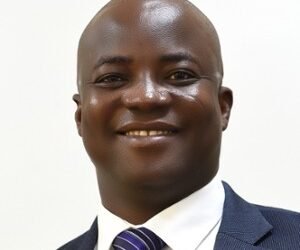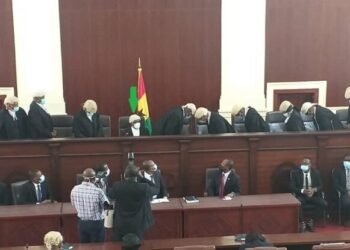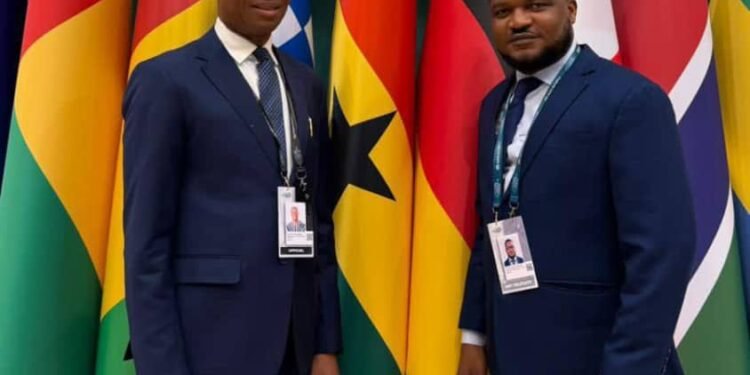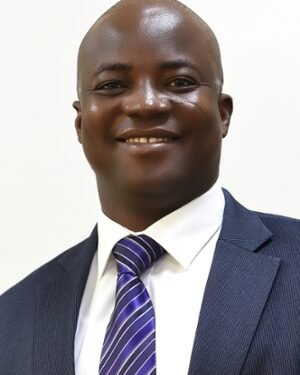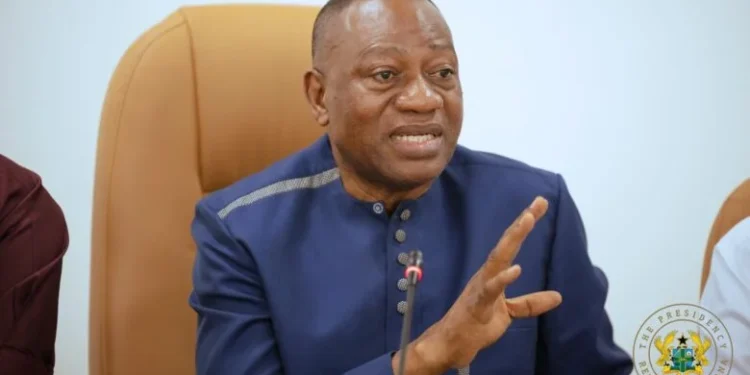Ghana’s President, John Dramani Mahama, has reaffirmed his administration’s unwavering commitment to environmental sustainability as he led a national tree planting exercise at Kwabenya Community Senior High School to mark the 2025 World Environment Day.
Addressing a crowd of students, environmental activists, local officials, and the media, President Mahama emphasised that the global environmental crisis has reached a critical tipping point—but it is one the world can still respond to with bold, collective action.
“This annual observance arrives at the critical junction when the world is facing escalating environmental threats. It also possesses the knowledge, tools, and collective will to take meaningful action for future generations.”
HE President John Dramani Mahama
He noted that this year’s global theme—Ending Plastic Pollution—was especially relevant for Ghana, which is grappling with a mounting plastic waste crisis.
Plastic waste, once considered a symbol of modern convenience, has become an environmental scourge, President Mahama warned. “It is clogging our gutters and waterways, littering our beaches, polluting our farmlands, and choking our urban streams,” he lamented.
Dire Predictions
Citing dire predictions by environmental experts, he cautioned that if urgent steps are not taken, by 2050, there may be more plastic in the ocean than fish.
“This sobering forecast should not lead us to despair, but rather stir us to action,” the President declared, noting that plastic pollution is not just a waste management issue, but a reflection of a deeper broken relationship between humans and nature.
To address the crisis, President Mahama outlined several interventions spearheaded by his government since returning to office. These include the appointment of a Minister of State for Climate Change and Sustainability to ensure environmental policies are integrated across all development sectors.
It also includes the introduction of a National Plastics Management Policy, that requires that manufacturers and importers have to take responsibility for the life cycle of the plastics that they produce and place on the market.
Additionally, President Mahama noted that his administration has a revised Solid Waste Management Strategy aimed at reducing the volume of plastics in landfills by 60% by 2030. The new strategy also mandates waste separation in all major municipalities.
“We’re already seeing progress: from Tamale to Takoradi, local governments are piloting source separation schemes. Colour-coded bins in markets have tripled recycling rates.
“Entrepreneurs are converting used plastics into building materials, textiles, and fuel briquettes. And you just saw the dust bins that you were presented with here. It is made from recycled plastic.”
HE President John Dramani Mahama
The President praised the mobilisation of faith-based groups and community volunteers for pre-rainy season clean-up exercises. “These examples prove that transformation is possible when public policy aligns with citizens’ action,” he said.
More Action: One Tree Per Child
However, President Mahama cautioned that much more remains to be done, asserting that plastics, due to their durability, can persist in the environment for millennia. He noted that a piece of plastic takes 25,000 years to degrade, underscoring the significance of the launch of the One Tree Per Child initiative.
The new program, he explained, is a nationwide afforestation campaign aimed at engaging every school-aged child in planting and nurturing at least one tree.
Each seedling, selected based on the local ecology, according to President Mahama will be distributed and monitored by environmental officers, forestry experts, and traditional leaders. By 2030, the initiative is expected to result in the planting of tens of millions of trees across Ghana.
“These are trees that will stabilise our soils, trees that will cool our cities, and trees that will absorb carbon dioxide and restore our degraded ecosystems. More importantly, each tree will serve as a lesson in responsibility, sustainability, and civic pride”.
HE President John Dramani Mahama
This new initiative, the President noted is builds on the foundation of the Tree for Life afforestation program, which he launched in March in the Ashanti region. That program targets the restoration of at least 7 million hectares of degraded land and the planting of millions of trees nationwide.
2025 National Tree Planting Exercise
As part of the 2025 commemorative activities, President Mahama also announced the official commencement of the 2025 National Tree Planting Exercise, which will run from June 5 to June 30, with an ambitious target of planting 30 million trees.
Calling on all Ghanaians—from school children and market traders to professionals and traditional authorities—he emphasised the importance of mass participation. “Let us leave behind a living legacy for generations yet unborn,” he appealed.
“Plastic pollution and deforestation may appear unrelated, but they stem from the exact root cause. Treating the environment as an afterthought. Addressing both demands and a fundamental shift in how we view development and placing sustainability, resilience, and equity at the centre of our development paradigm”.
HE President John Dramani Mahama
He outlined a vision of a Ghana where children plant and care for trees, where plastics are recycled and reused, and where public health is safeguarded through reduced emissions and green job creation. But achieving this, he stressed, requires partnerships across all sectors.
He called on government ministries to coordinate and enforce environmental regulations, local authorities to clamp down on illegal waste dumping, and security agencies to treat environmental laws as national security matters.
He urged the private sector to invest in recycling infrastructure and adopt circular economy practices. President Mahama also appealed to development partners to support green innovation and capacity-building programs through Ghana’s Circular Economy Centre of Excellence.
To the general public, President Mahama issued a clear challenge: “I will not litter. I will reduce my plastic use. I will plant and care for at least one tree.” He reminded the gathering that they had taken this pledge in his presence and urged them to hold themselves accountable.
“I don’t want to see any of you drink water from a plastic sachet and just throw it on the floor. Please walk to the next bin and put it in the bin so that it can be safely disposed of.
“Let us refuse single-use plastics, sort our waste at home, adopt sustainable alternatives, and teach our children through example that a clean, green Ghana is not only possible but it is a necessity.”
HE President John Dramani Mahama
National Intitaives to Sustain Public Engagement
Looking ahead, President Mahama announced a series of national initiatives to sustain public engagement. These include regional tree planting festivals, national clean-up drives, and an annual Green Innovation Expo to showcase homegrown environmental solutions.
The President acknowledged key partners and individuals supporting the green vision. He thanked the Chief Operating Officer of Maseko, who has pledged to assist in planting the 30 million trees. “They have done it before in Myanmar, and now they are bringing their expertise to Ghana,” he noted.
He also recognized Mr. Patrick Graham, a former English footballer turned environmental entrepreneur, who has established a plastic recycling plant in Ghana from his own funds.
The facility currently employs about 30 Ghanaian youth, contributing both to job creation and waste management. “Thank you, Patrick,” Mahama said. “This is the kind of private initiative we must celebrate and support.”
In a bold concluding policy announcement, the President declared his intention to issue a directive to end the use of wood in the production of school furniture, to curb deforestation. “We can’t be planting trees and cutting them down at the same time,” he said.
Moving forward, the President vowed that school furniture will be made from recycled plastic or metal, further advancing the country’s sustainability goals.
READ ALSO: IPGG Endorses Energy Levy as Lifeline for Ghana’s Power Sector




